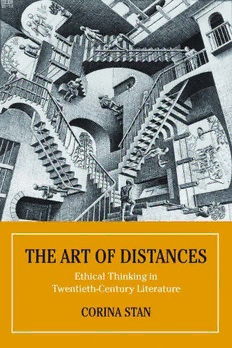
The Art of Distances: Ethical Thinking in Twentieth-Century European Literature PDF
Preview The Art of Distances: Ethical Thinking in Twentieth-Century European Literature
The Art of Distances The Art of Distances Ethical Thinking in Twentieth- Century Literature Corina Stan northwestern university press evanston, illinois Northwestern University Press www .nupress .northwestern .edu Copyright © 2018 by Northwestern University Press. Published 2018. All rights reserved. Printed in the United States of America 10 9 8 7 6 5 4 3 2 1 Library of Congress Cataloging- in- Publication Data Names: Stan, Corina, author. Title: The art of distances : ethical thinking in twentieth-century literature / Corina Stan. Description: Evanston, Illinois : Northwestern University Press, 2018. | Includes bibliographical references and index. Identifiers: LCCN 2017049335 | ISBN 9780810136854 (pbk. : alk. paper) | ISBN 9780810136861 (cloth : alk. paper) | ISBN 9780810136878 (ebook) Subjects: LCSH: European literature—20th century—History and criticism. | Ethics in literature. | Social distance—Philosophy. Classification: LCC PN49 .S674 2018 | DDC 809.93353—dc23 LC record available at https://lccn.loc.gov/2017049335 To Alex, Eliza, and Mihai Today . . . it is part of morality not to be at home in one’s home. — Theodor Adorno, Minima Moralia Contents Acknowledgments ix List of Abbreviations xiii Introduction: Adorno and Barthes on the Question of the Right (Di)stance 3 Part I. The Pathos of Distances in “a World of Banished People” Chapter 1 George Orwell’s Critique of Sincerity and the Obligation of Tactlessness 33 Chapter 2 The Inferno of Saviors: Notes in the Margin of Elias Canetti’s Lifework 69 Chapter 3 A Socialism of Distances, or On the Difficulties of Wise Love: Iris Murdoch’s Secular Community 115 Part II. “The World in Me”: The Distantiality of Everyday Life Chapter 4 In Search of a Whole Self: Benjamin’s Childhood Fragments 155 Chapter 5 Annie Ernaux’s Diaries of the Outside 171 Chapter 6 Günter Grass’s Century 197 Chapter 7 Damon Galgut on Emptying Oneself for Sleep 217 Conclusion 235 Notes 245 Index 297 Acknowledgments This is a book about distance and proximity, community and tact; in a cer- tain sense, people whose paths crossed with mine over the past few years have written it with me by offering renewed inspiration through gestures of kindness, friendship, and hospitality. It is hard to thank everyone, but here is a beginning: I could not have wished for a more exquisite balance between involvement and detachment from my committee while I was writing the dissertation in the Duke Literature Program. I am very grateful to my adviser, Toril Moi, for her generosity throughout the years. She has spent much time reading each of the chapters, writing detailed comments, reading new versions, and writing more comments. Her advising truly is an “art of distances,” balanc- ing criticism, encouragement, and praise, engaging with the ideas, paying careful attention to her students’ prose, and encouraging nuance. I must list my other committee members in some order, but what I have appreciated is how they have each offered something unique, therefore invaluable, to shape and support this project. After spending many delicious hours reading and discussing the poetry of Wallace Stevens and W. B. Yeats, or following closely the meanderings of Leopold Bloom in Frank Lentricchia’s seminars, something about the imponderable temporality of fondling textual details in a quiet classroom is attached, in my mind, to his name, inextricable from an unfailing sensitivity to the practicalities of everyday life. Geoffrey Harpham’s work on ethics inspired, in part, my own project. His claim, in The Character of Criticism, that ours is “a human practice of reflection and meditation that enlists every intellectual, affective, and experiential resource that a person has” made a deep impression on me as a student, as do, always, his unwaver- ing commitment to the humanities, the thrilling nuances of his anecdotes, and the gracious, subtle ways of his tact. Ian Baucom and Fredric Jameson were the members of my committee most interested in asking the “big questions,” hence the readers who encouraged me to think harder about the stakes of the project. Ian Baucom’s elegance as a scholar, his professionalism, and the gen- tlest manner of guiding his students’ thinking through difficult questions are still a model for me. Fred Jameson’s intellectual range and dedication to the life of the mind are, as all of his students know, beyond impressive; I still think of him as my most demanding “implied reader.” I also owe thanks to Michael Hardt, Alice Kaplan, Barbara Herrnstein- Smith, Valentin Mudimbe, James Applewhite, and Stephen Jaffe, who made intellectual life at Duke interesting ix
